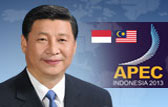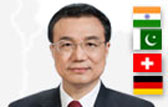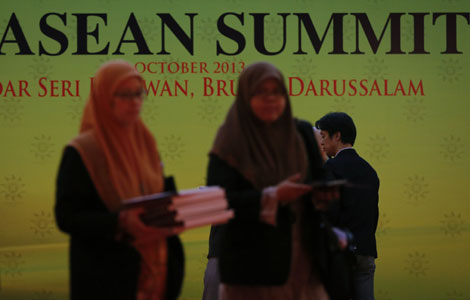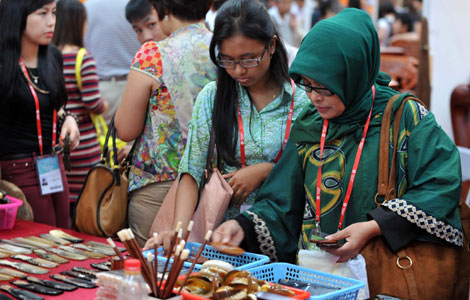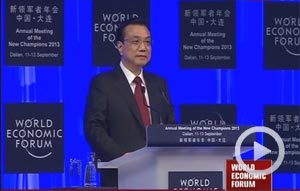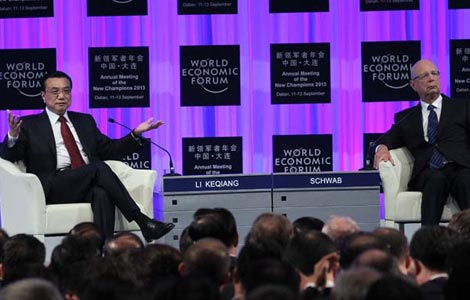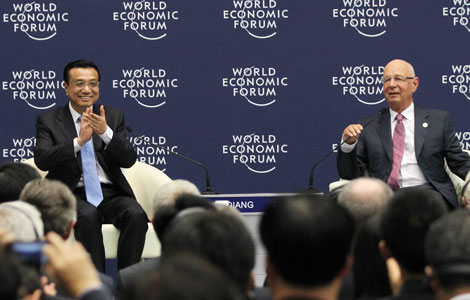China-ASEAN relationship still thrives
Updated: 2013-10-09 00:49Editor's note: Premier Li Keqiang gives joint written interview to media from ASEAN countries
Q: This year marks the 10th anniversary of China-ASEAN strategic partnership. How do you evaluate the achievements of this relationship over the past decade? What tangible benefits has this relationship brought to the two sides?
A: This year is indeed worthy of celebration for China and ASEAN. Ten years ago, China took the lead in acceding to the Treaty of Amity and Cooperation in Southeast Asia (TAC) and established the strategic partnership for peace and prosperity with ASEAN. It was also the first time for China to establish a global strategic partnership with an organization of nations within this region, which highlights the importance of ASEAN on China's diplomatic agenda. Against the backdrop of evolving international situation and growing world economy amid adjustments over the past decade, China and ASEAN have seized the opportunities, advanced with the trend of peace and development, and opened a "golden decade" of cooperation.
Over the past decade, China and ASEAN have stayed committed to strategic dialogue, enhanced political mutual trust, and strengthened mutual understanding and support in many important international and regional affairs. Over the past decade, China and ASEAN have advanced practical cooperation and set up the world's largest free trade area among developing countries. China is now ASEAN's biggest trading partner and ASEAN China's third-largest trading partner. Last year, two-way trade exceeded $400 billion, five times that of ten years ago; mutual investment totaled over $100 billion, three times that of ten years ago. Over the past decade, China and ASEAN have increased people-to-people and cultural exchanges. Exchange of visits reached 15 million last year, four times that of ten years ago. China has become ASEAN's second-largest source of tourists, and over 1,000 flights shuttle between the two sides every week. Over the past decade, China and ASEAN have stood side by side in times of adversity. On the basis of successfully fending off the Asian financial crisis, the two sides properly responded to the international financial crisis, and helped each other in tackling such major natural disasters and epidemics as the Indian Ocean tsunamis, the SARS epidemic and earthquakes.
The China-ASEAN strategic partnership has made such good progress as it serves the fundamental interests of both sides and complies with the trend of the times for peace, development and cooperation in the region. As long as we stay on the right course, and uphold the principles of mutual respect, equality, good-neighborliness and mutual benefit, as long as we continue to work together to maintain regional peace and stability, and deepen regional cooperation to drive economic development and improve people's livelihood, the China-ASEAN strategic partnership is bound to make even further progress and bring greater benefits to our region and people of various countries.
China-ASEAN relations have experienced a "golden decade". What do you think are the focus and growth areas for this relationship in the future?
Reviewing past development and looking into the future, we can see that China-ASEAN relationship now stands at a new historical starting point. We need to build on the achievements of the "golden decade", explore new strategic breakthroughs, and jointly build a closer China-ASEAN community of common destiny. To this end, we will propose a framework for wide-ranging, deep and high-level cooperation between China and ASEAN in the next decade so as to take our cooperation to a new height and bring more benefits to people in this region.
To achieve the goals under this framework of cooperation, I believe we need to focus our efforts in the following areas:
First, we need to remain committed to building good-neighborly relations. China is ready to actively discuss with ASEAN countries the signing of a treaty on good-neighborliness, friendship and cooperation to consolidate the political foundation for our strategic mutual trust.
Second, we need to strengthen exchange and cooperation in the security field. We need to improve the mechanism of ASEAN-China defense ministers' meeting and deepen cooperation in disaster prevention and relief, cybersecurity, combating transnational crimes, joint law enforcement and other nontraditional security fields.
Third, we need to build an "upgraded version" of the China-ASEAN FTA. We need to take concrete steps in trade in goods, trade in services, investment cooperation and other areas to promote trade and investment liberalization and facilitation and achieve the goal of $1 trillion of two-way trade by 2020.
Fourth, we need to push forward connectivity and step up the linkage between "software" and "hardware". China proposes to establish an Asian infrastructure investment bank and meet, on a priority basis, some ASEAN countries' need for financial support in infrastructure building.
Fifth, we need to strengthen financial cooperation to jointly guard against new risks. We need to increase the size and scope of bilateral currency swap, expand the pilot program of settling cross-border trade with local currencies and enhance cooperation on the Chiang Mai Initiative Multilateralization.
Sixth, we need to build a maritime cooperation partnership, intensify practical cooperation on marine economy, especially fishery, and in other areas such as maritime connectivity, marine environment protection and scientific research, and maritime search and rescue, and work together to build the Maritime Silk Road of the 21st century.
Seventh, we need to boost cultural exchanges. The two sides should jointly formulate the China-ASEAN Cultural Cooperation Action Plan to facilitate exchanges in culture and education, and between youth, think tanks and the media.
In a few days, I will attend the East Asia Leaders' meetings in Brunei. It will be my first visit to ASEAN countries as the Chinese premier. I look forward to exchanging views with leaders of other participating countries on issues of common interest and, in particular, to hearing their views on the above-mentioned seven proposals. Together, we will build new consensus on elevating the China-ASEAN strategic partnership.

